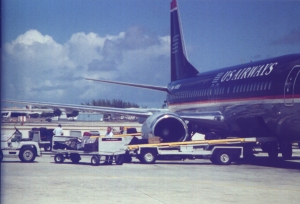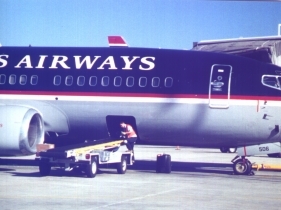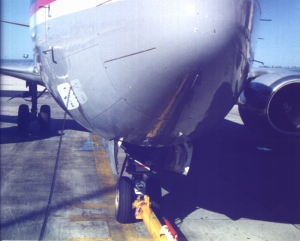PLEASE NOTE: THIS PAGE HAS A LOT OF GRAPHICS.
PLEASE BE PATIENT AS THE PAGE LOADS.
updated 2/25/2000
MY WORK, MY JOB, AND MY COMPANY
A tribute to USAirways, Inc. (...continued...)
Here are a few more pictures of my colleagues and I doing our jobs. Like I said, these are a great group
of people and I feel priveleged to work with them.



Two pictures of aircraft loading. On the left, we're loading the
main bulk of what will be transported. On the right, Ken (not me,
another Ken), loads the final bags just prior to departure. The
contraptions parked close to the airplane are known as belt-
loaders, which help us move the cargo from the carts to the
airplane's cargo bay.
This is the inside of a cargo bay of a 737.
Danny and Jose are loading baggage on
flight number 2335 to Charlotte here.


Ground: "Pushback completed, please confirm
parking brake set."
Captain: "Brakes set."
pause...
Captain: "We've got two good engine starts, you're
cleared to disconnect."
Ground: "Disconnecting. Standby for visual
at your left, have a good one."
This is N514US, a Boeing 737-300LR, just after
pushback. Both engines are running, ready to
taxi to runway 9, left, at Ft. Lauderdale. Too bad
you cant see it, but the Captain was smiling out
of his window for me in this picture!!
Captain: "Cockpit to ground."
Ground: "Pushback crew's on."
Captain: "We are ready for pushback."
Ground: "Confirm your brakes released."
Capatin: "Brakes released."
Ground: "Commencing the push, cleared
to start."
...and away we go! This is part of a standard
verbage used between Captain and the driver
of the pushback tractor. This picture is
taken just prior to moving the airplane.
The history of USAirways
I couldn't close this section about my employer and co-workers without some kind of abbreviated history
on USAirways. We have a very colorful history which begins in 1937 as the airline All American Airways,
which began flying mail between Jamestown, New York, and Johnstown, PA, using Stinson Reliant biplanes.
An ingenious system of hanging the mailbags between two poles was devised so that the airplanes were
able to pick up and drop off mail without having to land; more mail could be carried in less time. Mail
routes were added; soon All American Airways had a route network in the Allegheny valley area and in
northern Pennsylvania. Passenger service with All American Airways began some years later, and then
the airline's name was changed to Allegheny Airlines. The airline continued to grow; the route structure
was soon spanning from Boston in the northeast, to Washington, DC along the eastern seaboard, to Detroit
on the western edge. Allegheny was utilizing aircraft such as the DC-3, Martin 202 and Martin 404,
and later Convair 440 aircraft (all these are twin engine propeller airplanes).
Later on, Allegheny Airlines reached an agreement to purchase and merge with two other smaller
airlines, one serving the Great Lakes region (Lake Central Airlines) and Mohawk Airlines (serving
the upstate New York/northeast areas). In 1972, the name of this "Airline of Mergers" was changed to
USAir, befitting the world's sixth largest airline in terms of passenger boardings. USAir's route network
now spanned the entire country, and Canada: operations were concentrated on the eastern seaboard region
but spanned to Phoenix and Los Angeles in the west and to Florida in the south, and to Toronto and
Montreal in the north.
In 1988, Pacific Southwest Airlines was acquired and merged into the USAir route network, giving
USAir a major presence on the west coast. And in 1990, Piedmont Airlines, an airline whose operations
centered mainly in the southeastern United States, was acquired, and made the largest airline merger in
history when they were integrated into the USAir system.
In 1997, USAir changed its name to USAirways, introducing itself to the world marketplace, adding routes
to Europe, the Carribean, Mexico, and furthering services to Canada.
For more information on the history of USAirways, please visit my company's official website on the
history of the company, by clicking here. I have also put other sites of interest on USAir and USAirways
on my links page.
So that's my job and my company, folks, as best as I can give it in just a few web pages.
I hope you've enjoyed my narrative on USAirways...it is a great company to work for,
as I've said, and I plan to be around for a few more years, at least! So the next time you
fly USAirways into Fort Lauderdale, Florida, look down on the ramp. You just might
see me or one of my colleagues!!
Site Map
Go to next
page
Go back
one page
Send me
an e-mail!!
USAirways, USAir, Allegheny Airlines, All American Airways, Lake Central, Pacific Southwest Airlines,
Piedmont Airlines, and all associated logos are trademarks of USAirways Group, Inc.